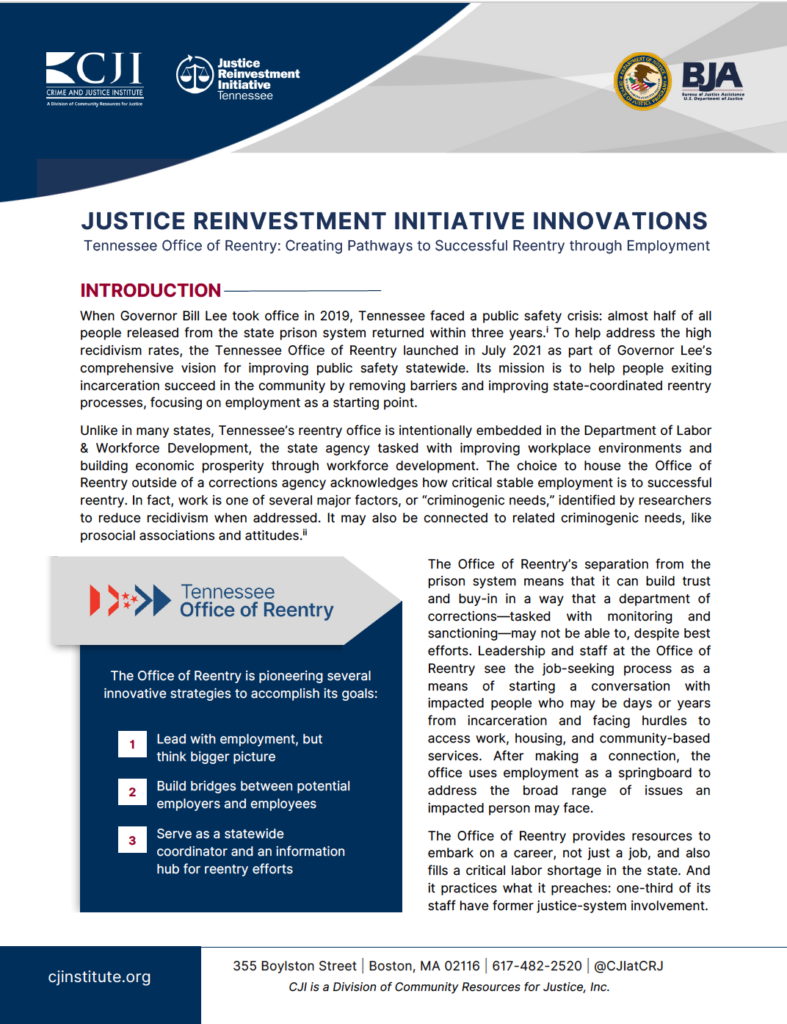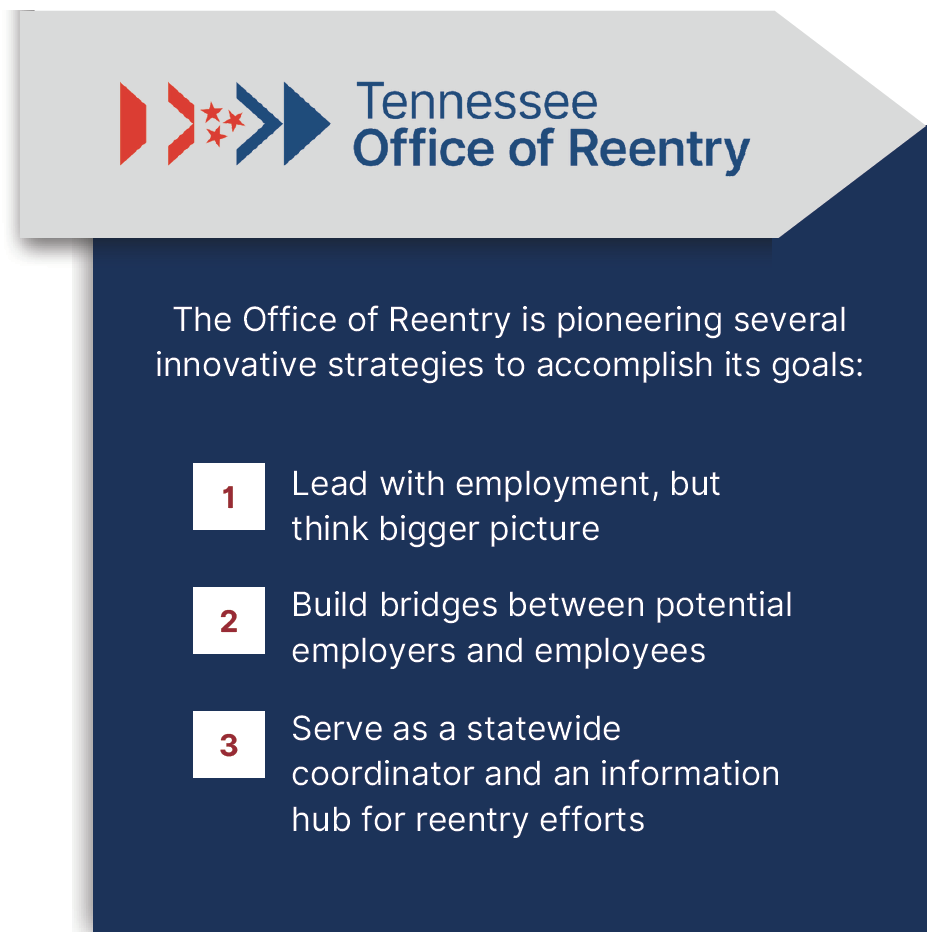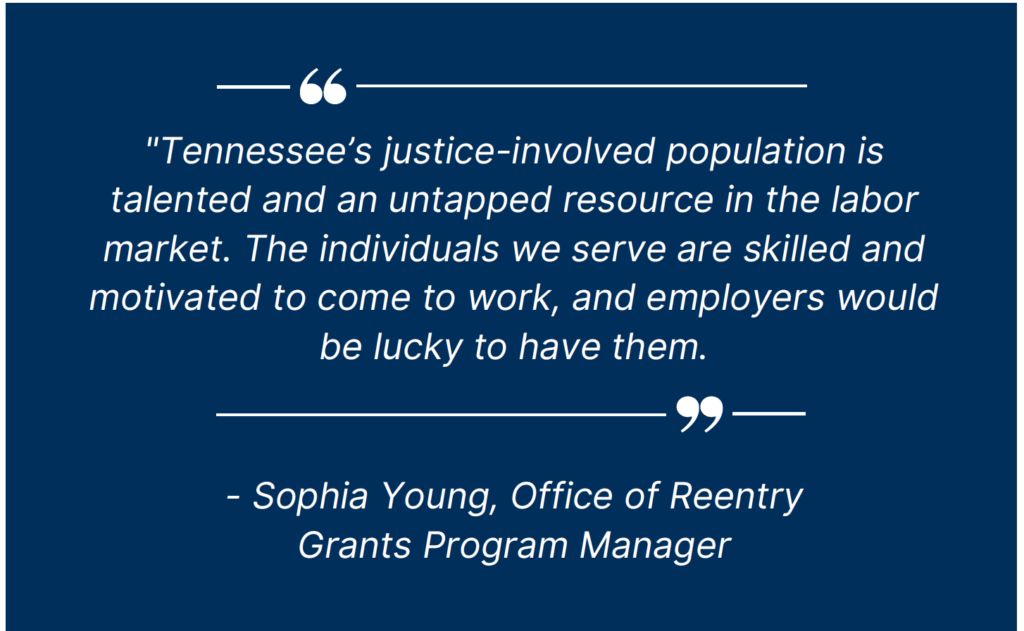Justice Reinvestment Initiative Innovations: Tennessee Office of Reentry: Creating Pathways to Successful Reentry through Employment

Introduction
When Governor Bill Lee took office in 2019, Tennessee faced a public safety crisis: almost half of all people released from the state prison system returned within three years.1 To help address the high recidivism rates, the Tennessee Office of Reentry launched in July 2021 as part of Governor Lee’s comprehensive vision for improving public safety statewide. Its mission is to help people exiting incarceration succeed in the community by removing barriers and improving state-coordinated reentry processes, focusing on employment as a starting point.
Unlike in many states, Tennessee’s reentry office is intentionally embedded in the Department of Labor & Workforce Development, the state agency tasked with improving workplace environments and building economic prosperity through workforce development. The choice to house the Office of Reentry outside of a corrections agency acknowledges how critical stable employment is to successful reentry. In fact, work is one of several major factors, or “criminogenic needs,” identified by researchers to reduce recidivism when addressed. It may also be connected to related criminogenic needs, like prosocial associations and attitudes.2

The Office of Reentry’s separation from the prison system means that it can build trust and buy-in in a way that a department of corrections—tasked with monitoring and sanctioning—may not be able to, despite best efforts. Leadership and staff at the Office of Reentry see the job-seeking process as a means of starting a conversation with impacted people who may be days or years from incarceration and facing hurdles to access work, housing, and community-based services. After making a connection, the office uses employment as a springboard to address the broad range of issues an impacted person may face.
The Office of Reentry provides resources to embark on a career, not just a job, and also fills a critical labor shortage in the state. And it practices what it preaches: one-third of its staff have former justice-system involvement.
Office of Reentry Strategies
1. Lead With Employment, but Think Bigger Picture
Justice system involvement limits work opportunities for many people. Criminal records may discourage employers from hiring qualified candidates, and certain types of employment or licensing may exclude people with criminal records. People with a history of incarceration may also lack educational credentials or professional skills and have gaps in their resumes. Yet many people exiting prison are highly motivated to start working to support themselves and their families and build a future.
The Office of Reentry strives to connect impacted people with resources to develop a career through programming such as job fairs, skills trainings, and credentialing courses. To serve impacted people at the local level, the office works through public-facing American Job Centers, state-funded employment centers that cover all ninety-five counties in Tennessee. The majority of these centers are staffed with Reentry Advisors specially trained in reentry best practices to coordinate local efforts and serve as a primary point of contact for impacted people.
The Office of Reentry recognizes that employment is just one piece of the reentry puzzle—lack of housing, transportation, and childcare can make maintaining employment impossible. With this in mind, the office sees job-seeking as an opportunity for staff at American Job Centers to make connections with impacted people and offer comprehensive, holistic resources to address barriers. Some of the many services offered include case management, housing assistance, and funding for gas, supplies, and childcare.
Additionally, the Office of Reentry seeks to serve a wider population than most statewide reentry offices, which are typically located in corrections agencies and target only people recently released from incarceration. Recognizing that arrests, criminal charges, and convictions may affect people years down the road, the office leverages its statewide reach through American Job Centers to connect with people who might have previous justice system involvement, including those released from incarceration years prior.
2. Build Bridges between Potential Employers and Employees
The Office of Reentry serves both employers and impacted people and connects them to each other through American Job Centers. Reaching out and building relationships, the Office of Reentry conducts “listening tours” to better understand the perspectives of employers, industry associations, and chambers of commerce. The office seeks to identify potential challenges to hiring impacted people while connecting employers to resources supporting their workforce needs.

The Office of Reentry makes the case for employers to hire impacted people by raising awareness of federal tax credits and bonding, as well as emphasizing the potential to fill a critical labor shortage. Staff also speak to the energy, eagerness, and talent of a population that has been historically overlooked as a resource.
“Tennessee’s justice-involved population is talented and an untapped resource in the labor market,” said Office of Reentry Grants Program Manager Sophia Young. “The individuals we serve are skilled and motivated to come to work, and employers would be lucky to have them.”
For potential employees, the Office of Reentry aims to connect them to a career path along with holistic support in their communities. Outreach begins before people leave custody: the office is partnering with Adult Education, another office within the Department of Labor & Workforce Development, along with experts at American Prison Data Systems, to distribute over 8,000 tablets equipped with reentry resources to jails throughout Tennessee. Tablets will connect to the state’s online job search portal, workforce development resources, educational programs, and a law library. In addition, the office plans to open an American Job Center inside a correctional facility to offer employment services pre-release.
The Office of Reentry assists people upon release by connecting them with a local American Job Center for training and employment support. Offerings include case management, skills training and credentialing, and supportive services to help people become—and stay—employed.
3. Serve as a Statewide Coordinator and an Information Hub for Reentry Efforts
The role of the Office of Reentry as a connector goes far beyond the employer-employee relationship. The office is a hub for reentry efforts statewide, providing resources and trainings, enhancing existing networks, and building new bridges between diverse stakeholders, including correctional facilities, service providers, and educational institutions. As a first step, staff researched the existing employment landscape and went on a statewide tour to understand what reentry services are already in place, what is working, and what challenges impacted people face. This type of outreach is ongoing and allows the office to address issues, coordinate key players, and replicate successful practices.
Simultaneously, and complementing this outreach, the Office of Reentry prioritizes data collection and analysis and employs a full-time staff member focusing on data and research. The overarching goal is to better understand and address issues facing impacted people, with a special focus on helping siloed agency data systems better share information.
Sifting through state workforce data, Office of Reentry staff realized that there was no means to measure progress for impacted people because there was no way to identify jobseekers with prior justice system involvement. As a result, one of the office’s first projects was to create a new button in Tennessee’s online job and service delivery platform that allows jobseekers to self-identify as justice involved. In this way, the Office of Reentry and American Job Centers can better track and serve each person, as well as assess systemwide outcome data.

The Future
This new approach to reentry by the Office of Reentry tethers employment to holistic supports that help people exiting incarceration realize success in the community. Making the case to both employers and impacted people, it serves as a statewide coordinator of reentry efforts. It also continues to forge relationships and collaborate with groups serving impacted people including, to name a few, the Tennessee Department of Correction, Tennessee Corrections Institute, Tennessee Department of Mental Health & Substance Abuse Services, Tennessee Department of Human Resources, Tennessee Department of Safety & Homeland Security, Tennessee Administrative Office of the Courts, Tennessee Board of Regents, and Tennessee Higher Education in Prison Initiative.
The Office of Reentry is committed to continually evaluating and improving its efforts. Its future direction will be informed by ongoing conversations with impacted people and stakeholders, along with data collection and analysis. The Crime and Justice Institute (CJI), funded by the Bureau of Justice Assistance (BJA), a component of the Department of Justice’s Office of Justice Programs, provides ongoing technical assistance to the Office of Reentry in forging this new path.
“Our team is committed to fostering the strengths and talents of people returning to the community,” said Office of Reentry Director William Arnold. “Their success is our success—when they succeed, our state, our communities, and our families succeed.”
About JRI
The Justice Reinvestment Initiative (JRI) is a data-driven process funded through a public-private partnership between the Department of Justice Office of Justice Programs’ Bureau of Justice Assistance and the Pew Charitable Trusts. JRI aims to improve public safety by helping states make their justice systems more fair, effective, and efficient as they direct resources to address the complex factors that drive crime and recidivism.
The Crime and Justice Institute (CJI) has more than a decade of experience as a JRI technical assistance provider, supporting states through assessing strengths and needs, conducting data analysis, facilitating policy development, and assisting with implementation.
This brief is the first in a series that highlights innovative, research-driven efforts in JRI states. These promising practices may serve as models for other jurisdictions seeking to improve their justice systems.
Acknowledgements
This brief was prepared by Lisa Margulies, with assistance from Amanda Coscia, Barbara Pierce, Christian Schiavone, Abigail Strait, and Meagan Winn.
This project was supported by Grant No. 2019-ZB-BX-K003 awarded by the Bureau of Justice Assistance. The Bureau of Justice Assistance is a component of the Department of Justice’s Office of Justice Programs, which also includes the Bureau of Justice Statistics, the National Institute of Justice, the Office of Juvenile Justice and Delinquency Prevention, the Office for Victims of Crime, and the SMART Office. Points of view or opinions in this document are those of the author and do not necessarily represent the official position or policies of the U.S. Department of Justice.
Endnotes
- Mandy Pellgrin, Community Supervision, Prison Releasees, and Recidivism Tennessee (Nashville, TN: The Sycamore Institute, 2019), https://www.sycamoreinstitutetn.org/probation-parole-release-recidivism/.
- James Bonta and Donald A. Andrews. “Risk-need-responsivity model for offender assessment and rehabilitation,” Rehabilitation 6, no. 1 (2007).


JRI Innovations Series, Tennessee Office of Reentry: Creating
Pathways to Successful Reentry through Employment
